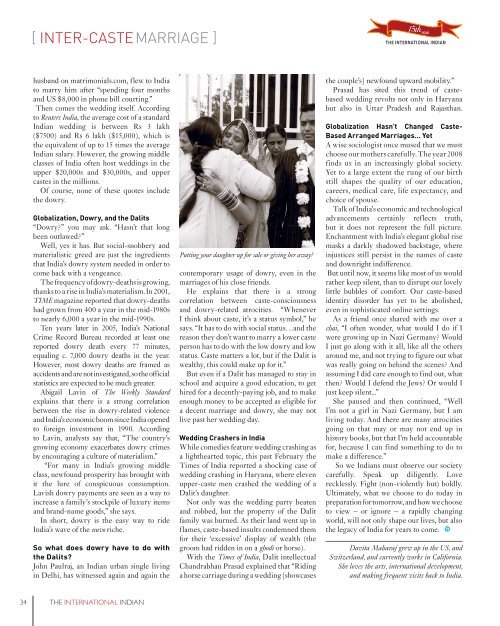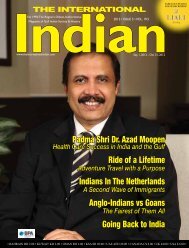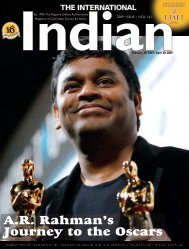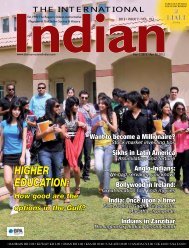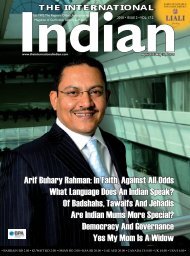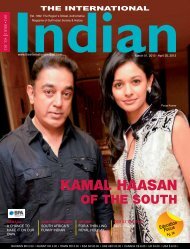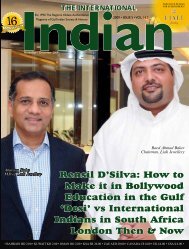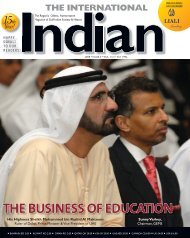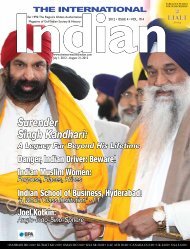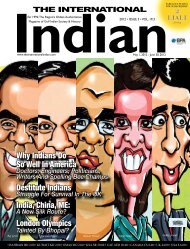THE INTERNATIONAL - International Indian
THE INTERNATIONAL - International Indian
THE INTERNATIONAL - International Indian
You also want an ePaper? Increase the reach of your titles
YUMPU automatically turns print PDFs into web optimized ePapers that Google loves.
[ INTER-CASTE MARRIAGE ]<br />
husband on matrimonials.com, flew to India<br />
to marry him after “spending four months<br />
and US $8,000 in phone bill courting.”<br />
Then comes the wedding itself. According<br />
to Reuters India, the average cost of a standard<br />
<strong>Indian</strong> wedding is between Rs 3 lakh<br />
($7500) and Rs 6 lakh ($15,000), which is<br />
the equivalent of up to 15 times the average<br />
<strong>Indian</strong> salary. However, the growing middle<br />
classes of India often host weddings in the<br />
upper $20,000s and $30,000s, and upper<br />
castes in the millions.<br />
Of course, none of these quotes include<br />
the dowry.<br />
Globalization, Dowry, and the Dalits<br />
“Dowry?” you may ask. “Hasn’t that long<br />
been outlawed?”<br />
Well, yes it has. But social-snobbery and<br />
materialistic greed are just the ingredients<br />
that India’s dowry system needed in order to<br />
come back with a vengeance.<br />
The frequency of dowry-deaths is growing,<br />
thanks to a rise in India’s materialism. In 2001,<br />
TIME magazine reported that dowry-deaths<br />
had grown from 400 a year in the mid-1980s<br />
to nearly 6,000 a year in the mid-1990s.<br />
Ten years later in 2005, India’s National<br />
Crime Record Bureau recorded at least one<br />
reported dowry death every 77 minutes,<br />
equaling c. 7,000 dowry deaths in the year.<br />
However, most dowry deaths are framed as<br />
accidents and are not investigated, so the official<br />
statistics are expected to be much greater.<br />
Abigail Lavin of The Weekly Standard<br />
explains that there is a strong correlation<br />
between the rise in dowry-related violence<br />
and India’s economic boom since India opened<br />
to foreign investment in 1990. According<br />
to Lavin, analysts say that, “The country’s<br />
growing economy exacerbates dowry crimes<br />
by encouraging a culture of materialism.”<br />
“For many in India’s growing middle<br />
class, newfound prosperity has brought with<br />
it the lure of conspicuous consumption.<br />
Lavish dowry payments are seen as a way to<br />
increase a family’s stockpile of luxury items<br />
and brand-name goods,” she says.<br />
In short, dowry is the easy way to ride<br />
India’s wave of the nuvo riche.<br />
So what does dowry have to do with<br />
the Dalits?<br />
John Paulraj, an <strong>Indian</strong> urban single living<br />
in Delhi, has witnessed again and again the<br />
Putting your daughter up for sale or giving her away?<br />
contemporary usage of dowry, even in the<br />
marriages of his close friends.<br />
He explains that there is a strong<br />
correlation between caste-consciousness<br />
and dowry-related atrocities. “Whenever<br />
I think about caste, it’s a status symbol,” he<br />
says. “It has to do with social status…and the<br />
reason they don’t want to marry a lower caste<br />
person has to do with the low dowry and low<br />
status. Caste matters a lot, but if the Dalit is<br />
wealthy, this could make up for it.”<br />
But even if a Dalit has managed to stay in<br />
school and acquire a good education, to get<br />
hired for a decently-paying job, and to make<br />
enough money to be accepted as eligible for<br />
a decent marriage and dowry, she may not<br />
live past her wedding day.<br />
Wedding Crashers in India<br />
While comedies feature wedding crashing as<br />
a lighthearted topic, this past February the<br />
Times of India reported a shocking case of<br />
wedding crashing in Haryana, where eleven<br />
upper-caste men crashed the wedding of a<br />
Dalit’s daughter.<br />
Not only was the wedding party beaten<br />
and robbed, but the property of the Dalit<br />
family was burned. As their land went up in<br />
flames, caste-based insults condemned them<br />
for their ‘excessive’ display of wealth (the<br />
groom had ridden in on a ghodi or horse).<br />
With the Times of India, Dalit intellectual<br />
Chandrabhan Prasad explained that “Riding<br />
a horse carriage during a wedding [showcases<br />
the couple’s] newfound upward mobility.”<br />
Prasad has sited this trend of castebased<br />
wedding revolts not only in Haryana<br />
but also in Uttar Pradesh and Rajasthan.<br />
Globalization Hasn’t Changed Caste-<br />
Based Arranged Marriages… Yet<br />
A wise sociologist once mused that we must<br />
choose our mothers carefully. The year 2008<br />
finds us in an increasingly global society.<br />
Yet to a large extent the rung of our birth<br />
still shapes the quality of our education,<br />
careers, medical care, life expectancy, and<br />
choice of spouse.<br />
Talk of India’s economic and technological<br />
advancements certainly reflects truth,<br />
but it does not represent the full picture.<br />
Enchantment with India’s elegant global rise<br />
masks a darkly shadowed backstage, where<br />
injustices still persist in the names of caste<br />
and downright indifference.<br />
But until now, it seems like most of us would<br />
rather keep silent, than to disrupt our lovely<br />
little bubbles of comfort. Our caste-based<br />
identity disorder has yet to be abolished,<br />
even in sophisticated online settings.<br />
As a friend once shared with me over a<br />
chai, “I often wonder, what would I do if I<br />
were growing up in Nazi Germany? Would<br />
I just go along with it all, like all the others<br />
around me, and not trying to figure out what<br />
was really going on behind the scenes? And<br />
assuming I did care enough to find out, what<br />
then? Would I defend the Jews? Or would I<br />
just keep silent...”<br />
She paused and then continued, “Well<br />
I’m not a girl in Nazi Germany, but I am<br />
living today. And there are many atrocities<br />
going on that may or may not end up in<br />
history books, but that I’m held accountable<br />
for, because I can find something to do to<br />
make a difference.”<br />
So we <strong>Indian</strong>s must observe our society<br />
carefully. Speak up diligently. Love<br />
recklessly. Fight (non-violently but) boldly.<br />
Ultimately, what we choose to do today in<br />
preparation for tomorrow, and how we choose<br />
to view – or ignore – a rapidly changing<br />
world, will not only shape our lives, but also<br />
the legacy of India for years to come.<br />
Davita Maharaj grew up in the US, and<br />
Switzerland, and currently works in California.<br />
She loves the arts, international development,<br />
and making frequent visits back to India.<br />
34<br />
<strong>THE</strong> <strong>INTERNATIONAL</strong> INDIAN


